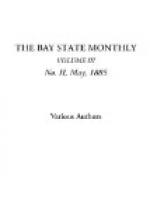SARAH and ANGELINA GRIMKE were born in Charleston, South Carolina; Sarah, Nov. 26, 1792; Angelina, Feb. 20, 1805. They were the daughters of the Hon. John Fauchereau Grimke, a colonel in the revolutionary war, and judge of the Supreme Court of South Carolina. His ancestors were German on the father’s side, French on the mother’s; the Fauchereau family having left France in consequence of the revocation of the Edict of Nantes in 1685.
Judge Grimke’s position, character, and wealth placed his family among the leaders of the very exclusive society of Charleston. His children were accustomed to luxury and display, to the service of slaves, and to the indulgence of every selfish whim, although the father’s practical common-sense led him to protest against the habits to which such indulgences naturally led. To Sarah he paid particular attention, and was often heard to declare that if she had been of the other sex she would have made the greatest jurist in the land.
Children are born without prejudice, and the young children of Southern planters never felt or made any difference between their white and colored playmates. So that there is nothing singular in the fact that Sarah Grimke early felt such an abhorrence of the whole institution of slavery that she was sure it was born in her.
When Sarah was twelve years old two important events occurred to interrupt the even tenor of her life. Her brother Thomas was sent off to Yale College, leaving her companionless; but a little sister, Angelina Emily, the last child of her parents, and the pet and darling of Sarah from the moment the light dawned upon her blue eyes, came to take his place. Sarah almost became a mother to this little one; whither she led, Angelina followed closely.
In 1818 Judge Grimke’s health began to decline. So faithful did Sarah nurse him that when it was decided that he should go to Philadelphia, she was chosen to accompany him. This first visit to the North was the most important event of Sarah’s life, for the influences and impressions there received gave some shape to her vague and wayward fancies, and showed her a gleam of the light beyond the tangled path which still stretched before her.
Her father died; and in the vessel which carried his remains from Philadelphia Sarah met a party of Friends. She talked with them on religious matters, and after a few months acknowledged to one of them, in the course of a correspondence, her entire conversion to Quakerism. Ere long circumstances and the inharmonious life in her family urged her again to seek Philadelphia, where she arrived in May, 1821. Angelina remained at Charleston, where she grew up a gay, fashionable girl.
We pass over the interesting correspondence which, from this time onward, was carried on between the sisters.




